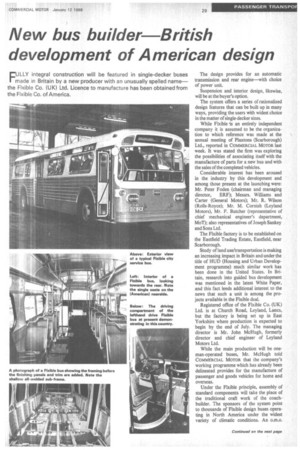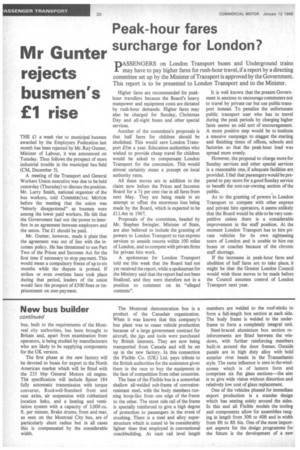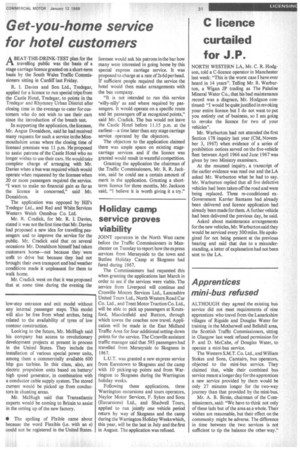New bus builder British development of American design
Page 31

Page 32

Page 33

If you've noticed an error in this article please click here to report it so we can fix it.
FULLY integral construction will be featured in single-decker buses made in Britain by a new producer with an unusually spelled name— the Flxible Co. (UK) Ltd. Licence to manufacture has been obtained from the Flxible Co. of America.
The design provides for an automatic transmission and rear engine—with choice of power unit.
Suspension and interior design, likewise, will be at the buyer's option.
The system offers a series of rationalized design features that can be built up in many ways, providing the users with widest choice in the matter of single-decker sizes.
While Flxible is an entirely independent company it is assumed to be the organization to which reference was made at the annual meeting of Plaxtons (Scarborough) Ltd., reported in COMMERCIAL MOTOR last week. It was stated the firm was exploring the possibilities of associating itself with the manufacture of parts for a new bus and with the sales of the completed vehicles.
Considerable interest has been aroused in the industry by this development and among those present at the launching were: Mr. Peter Foden (chairman and managing director, ERF); Messrs. Williams and Carter (General Motors); Mr. R. Wilson (Rolls-Royce); Mr. M. Cornish (Leyland Motors), Mr. F. Butcher (representative of chief mechanical engineer's department, MoT); also representatives of Joseph Sankey and Sons Ltd.
The Flxible factory is to be established on the Eastfield Trading Estate, Eastfield, near Scarborough.
Study of land use/transportation is making an increasing impact in Britain and under the title of HUD (Housing and Urban Development programme) much similar work has been done in the United States. In Britain, research into guided bus development was mentioned in the latest White Paper, and this fact lends additional interest to the news that such a unit is among the projects available in the Flxible deal.
Registered office of the Flxible Co. (UK) Ltd. is at Church Road, Leyland, Lanes, but the factory is being set up in East Yorkshire where production is expected to begin by the end of July. The managing director is Mr. John McHugh, formerly director and chief engineer of Leyland Motors Ltd.
While the main production will be oneman-operated buses, Mr. McHugh told COMMERCIAL Mo-roR that the company's working programme which has already been delineated provides for the manufacture of passenger and goods vehicles for home and overseas.
Under the Fixible principle, assembly of standard components will take the place of the traditional craft work of the coachbuilder. The sponsors of the system point to thousands of Flxible design buses operating in North America under the widest variety of climatic conditions. An o.m.o. bus, built to the requirements of the Montreal city authorities, has been brought to Britain and, apart from examination from operators, is being studied by manufacturers who are likely to be supplying components for the UK version.
The first phase at the new factory will be devoted to buses for export to the North American market which will be fitted with the 235 bhp General Motors oil engine. The specification will include Spicer 184 fully automatic transmission with torque converter, Rockwell-Standard front and rear axles, air suspension with rubberized location links, and a heating and ventilation system with a capacity of 3,000 Cu. ft. per minute. Brake drums, front and rear, as seen on the Montreal City bus, are of particularly short radius but in all cases this is compensated by the considerable width. The Montreal demonstration bus is a product of the Canadair organization. When it was known that this company's bus plant was to cease vehicle production because of a large government contract for aircraft, the jigs and tools were purchased by British interests. They are now being transported from Canada and will be set up in the new factory. In this connection the Flxible Co. (UK) Ltd. pays tribute to the British authorities for the assistance given them in the race to buy the equipment in the face of competition from other countries.
The base of the Flxible bus is a somewhat shallow all-welded sub-frame of corrosionresistant steel, with the body members running hoop-like from one edge of the frame to the other. The stout side rail of the frame is specially reinforced to give a high degree of protection to passengers in the event of crushing. There is a steel and alloy superstructure which is stated to be considerably lighter than that employed in conventional coachbuilding. At cant rail level length members are welded to the roof-sticks to form a full-length box section at each side. The body frame is welded to the underframe to form a completely integral unit.
Steel-braced aluminium box section reinforcements are fitted between the windows, with further reinforcing members built-in around the door frames. Outside panels are in high duty alloy with bold exterior rivet heads in the Transatlantic style. The same influence is seen in the windscreen which is of lantern form and comprises six flat glass sections—the aim is to give wide vision without distortion and relatively low cost of glass replacement.
One of the vehicles phased for immediate export production is a standee design which has seating solely around the sides. In this and all Flxible models the tooling and components allow for assemblies ranging in length from 30ft to 40ft and in width from 8ft to 8ft 6in. One of the most important aspects for the design programme for the future is the development of a new low-step entrance and exit model without any internal passenger steps. This model will also be free from wheel arches, being related to the availability of tyres of low contour construction.
Looking to the future, Mr. McHugh said his company has access to revolutionary development projects at present in process in the United States. They include the installation of various special power units, among them a commercially available 600 bhp gas turbine. In this class, also, are electric propulsion units based on battery/ high speed generator, in combination with a conductor cable supply system. The stored current would be picked up from conductors in shunting areas.
Mr. McHugh said that Transatlantic experts would be coming to Britain to assist in the setting up of the new factory.
• The spelling of Flxible came about because the word Flexible (i.e. with an e) could not be registered in the United States.
















































































































